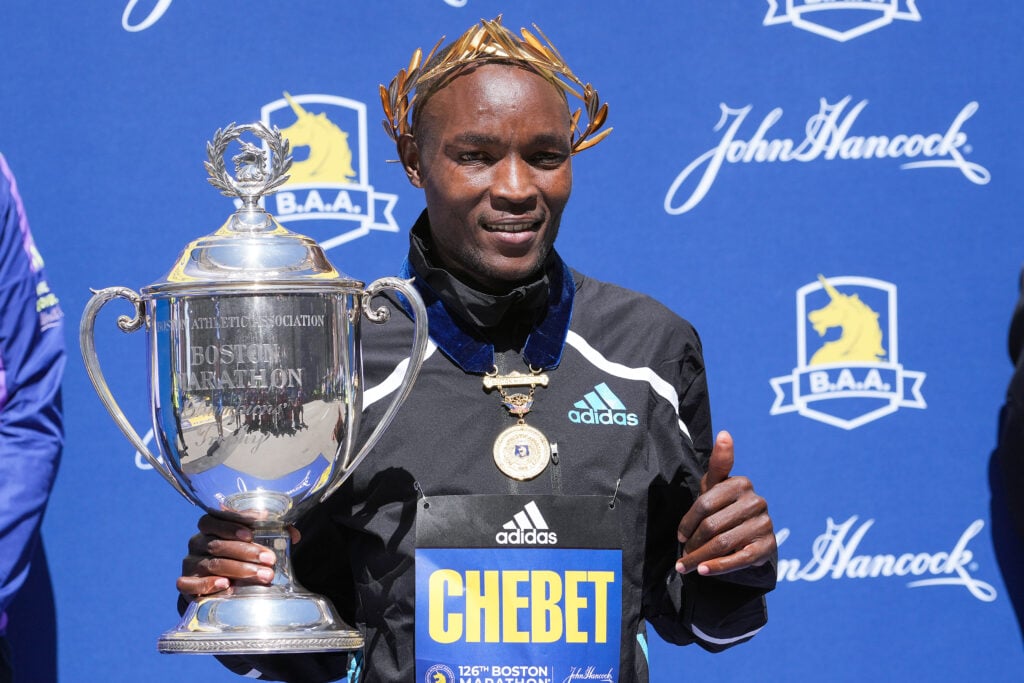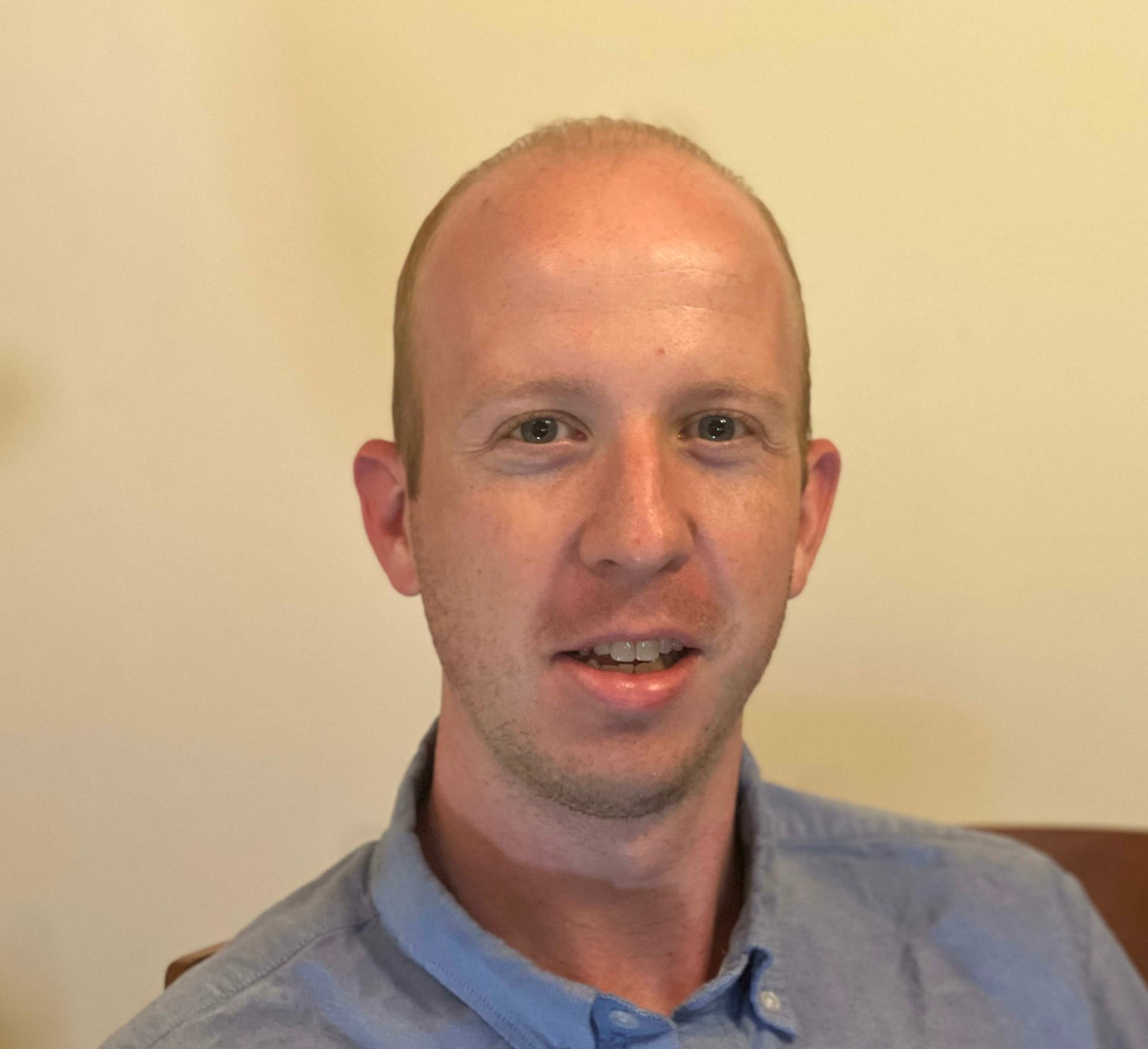Q&A With Reigning Champ Evans Chebet Ahead of 2023 Boston Marathon
By Jonathan GaultIn 2022, Kenya’s Evans Chebet had a year most marathoners could only dream about. In April he used a crazy 13:55 split from 35k to 50k to win the Boston Marathon in 2:06:51 — the third-fastest winning time in Boston history. Seven months later, he ran 2:08:41 to win the New York City Marathon, becoming just the fifth man to win both races in the same year. Right now, he is the best marathoner on Planet Earth not named Eliud Kipchoge.
On Monday, Chebet will seek to become the first man to repeat in Boston since Robert Kipkoech Cheruiyot won three straight from 2006-08. But if he is to accomplish that feat, he will have to defeat Kipchoge who is running Boston for the first time.
Ahead of his return to Boston, Chebet’s sponsor adidas made him available for an email interview with LetsRun.com (his responses were translated from Swahili to English). Chebet spoke about his upbringing in Kenya (he was raised by his uncle after his father died and his mother moved away for a new job), what a typical training week looks like, and how his big paydays in Boston and New York have changed his life and the lives of his family.
LRC: Congratulations on a terrific 2022 season, winning in Boston and New York. How did you celebrate those victories? How did you spend (or invest) the prize money?
EC: Thank you. After winning Boston, I only had a bit of down time before starting to train for the New York City Marathon. Following New York – my second major marathon win in a year – I celebrated properly with my coach, teammates, family and friends. In early December, I also got married. I used the prize money to help my family members buy new homes to live more comfortably, and also invested in new training facilities for my local hometown in Kenya to provide more opportunities for the next generation of athletes. My success in the sport continues to change not just my life, but my family’s as well, and I’m proud that my athletic accomplishments will leave a legacy and benefit future generations.
You are part of one of the world’s best training groups, the 2 Running Club, with athletes like (Chicago champ) Benson Kipruto and (London champ) Amos Kipruto. How often do you train with them?
We all train together every day, sometimes more than once a day. The group is very tight-knit, and we support and encourage each other to perform at our best. We train together most of the time, but Coach will personalize training depending on each of our needs. Training with such talented athletes is motivating and helps me continue to improve. adidas supports us all to be the best athletes we can be.
Does it get competitive at practice sessions? Who usually comes out on top?
We train as a group but we have enough experience to know when it is time to push each other and when it’s time to focus on our own training and sensations. The group helps for sure though to bring out the best in each of us. After having run 27 marathons, my coach also knows and trusts how my teammates and I will manage our training together. We all have our own styles and approaches, so in group training we focus on our individual strengths whilst leaning on each other to improve areas we need to develop. Due to this, each of us comes out on top in different kinds of sessions – that’s the beauty of training in such a talented group.
What is it going to be like for you racing against Benson in Boston? Do you expect to work together with him in the race at all or will it be every man for himself?
It is always great to have a familiar face on the course, but at the same time, we are each other’s competition and both have individual goals for the race. Benson and I bring out the best in each other during races and always remain close friends outside of racing. During the first half of the race, I expect to be in the front pack with Benson keeping up with the pacemakers, but the second half is when the race truly begins. Our different strengths will come into play as the race progresses. We are rivals but we are not enemies – having a training mate is an advantage because we can help each other interpret how the race is evolving. Also, in the lead up to the race, there are times when we can train and prepare together while keeping each other entertained.
What does a typical week of training look like for you?
A typical training cycle during a specific period is made up of roughly 10 days. This usually will constitute a longer session, which can go up to 40K, made up of an intensity of average pace, which is slower than marathon pace and up to marathon pace (progression). 25-30k a day – two times a day – is usually how we break up training. We have shorter interval workouts for a total distance of 12-16k and we have longer, more marathon specific sessions with total volume up to 16-25k. In terms of which shoes we are using for our workouts, adidas has an Adizero shoe to fit all running purposes, so I use different shoes to fit my needs – I wear the Adizero SL for easy runs, the Adizero Boston 11 for interval sessions, the Adizero Takumi Sen 9 for tempos and fartleks, the Adizero Adios 7 for road sessions and the Adizero Adios Pro 3 for race-paced workouts and long runs.
What was the best workout you ran in 2022? What were your splits and where/when did you run it?
For Boston 2022, around 25 days before the race, I did a 35k training run on a hilly course on tarmac road. For this run, I used the Adizero Adios Pro 3 to replicate the effort and feel with my actual race day shoe. I was able to close the last 10k in 30:15 (again, on a hilly course) while feeling very comfortable and in control. That is when I felt that things were coming together for Boston. Two weeks later I ran 2:06:51!
The first result listed for you in an online database is from 2011 – the Gargnano Dieci Miglia del Garda 10-mile race in Italy when you were 22 years old. When did you begin running? What did you do before you began racing competitively?
I got into running thanks to my nephew Isaac. He asked me to go running with him in a place where many Kenyan athletes train. It was a key moment in my life because without Isaac, I wouldn’t have discovered I could be a runner. I am so grateful and today, Isaac manages my businesses.
As a kid, life wasn’t easy. My father died when I was very young. I can’t remember him. My mom had to move away to find a job, leaving me with my uncle’s family. I’m from a large family and had to leave school early because we could no longer afford it. I started working, making charcoal and taking care of the cattle.
Nowadays in my free time, I really enjoy going around my farm, supervising the maize and wheat and checking to see my animals are all fine. It is of course a business, but for me it is also a hobby.
You didn’t win any of your first 10 marathons but have now won five of your last six. What changed in the last few years that allowed you to go from contending for the win in marathons to winning them?
In the early stages of my career, I often finished in 2nd place (Editor’s note: Evans finished in 2nd in 6 of his 1st 10 marathons), but I knew my time would come. Like the marathon itself, it is also a long process to learn how to best prepare and run a marathon. Then of course from the moment I won my first marathon, things felt a bit easier as I started to gain more confidence in myself. I also learned that being a winner is not just a question of physical preparation and training, it also has a lot to do with your mindset.
What is your biggest strength as a marathoner?
My biggest strength as a marathoner is knowing when to make my decisive move in the race. Tactics and mental toughness are almost more important than fitness when it comes to race day. When I put in a big surge in the latter stages of the marathon, I can maintain that pace and separate myself from the rest of the field.
In Boston, you will be facing the world record holder and Olympic champion Eliud Kipchoge. How do you feel about getting the opportunity to race him? Do you believe you can beat him, and if so, what is the key to beating him?
Eliud is an incredible athlete and it’s an honor to go up against him. I don’t shy away from competition; I embrace the challenge. I’m coming into Boston feeling strong and confident in my training. I look forward to running my race and believe the results will speak for themselves.
Have you made any tweaks to your training ahead of Boston 2023 compared to Boston 2022? If so, what are they?
Nothing too drastic has changed in my training ahead of Boston this year compared to last year. My training approach worked out perfectly for me last year, so I didn’t want to change too much. I’ve been focusing on keeping my body healthy in the lead up and making sure I get to the start line in the best shape possible.
How has your training for Boston gone? Have you had any injuries or setbacks?
My training for Boston has gone as well as I could have hoped. The times I’m hitting in sessions and long runs have given me great confidence going into the race. I’ve not had any major injuries or setbacks in the build-up, which I attribute to my strong coaching set-up, as well as a renewed focus on rest and recovery alongside my training. My body feels prepped and ready going into Boston.
More:
- The Babe Ruth of Marathons Is Running Boston This Year — Don’t Miss It The GOAT in the marathon – Eliud Kipchoge – is the first current men’s marathon world record holder to run Boston since 1954. How will he do in his first hilly marathon? If you consider yourself a sports fan, you owe it to yourself to see him in person if you live nearby.
- 2023 Boston Men’s Preview: Can Anyone Beat Eliud Kipchoge? Kipchoge will have his hands full with the last two Boston champs, Benson Kipruto and Evans Chebet.
- Complete 2023 Boston Marathon Coverage
Boston messageboard discussion.





